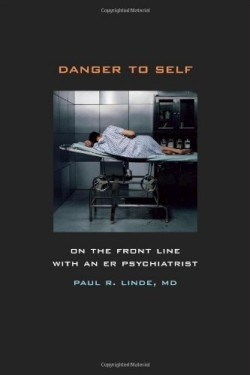Danger to Self
On the Front Line with an ER Psychiatrist
Storytelling and medical research collide in the psychiatric emergency room, and Dr. Paul Linde uses both to show readers the full range of day-to-day life in the ER. Linde’s story-peopled with the insane and the suicidal, caretakers and prisoners-shows a world off-limits to most, teaching us about patient care under dramatic, high-stakes circumstances. As a result, Danger to Self speaks both to health professionals and those interested in a good story; Linde delivers through chapters dedicated to individual cases and the insights they provide.
Linde opens his memoir with an unusual assertion: “I love my job when I’m not there,” he writes. His vivid, often chilling descriptions of the situations he must mediate show us why. We see, among other dark San Francisco sights, a “dilapidated” prison where inmates catcall a younger Linde; a survey of the psych emergency waiting room, replete with patients who speak gibberish, touch themselves, and menace other people; and Linde’s own office, where, in one instance, he treats a homicidal patient who is tapping the walls to determine the best place to stash a bomb on his next visit. Linde narrates his experiences with a doctor’s precision and a compelling attention to detail.
When two police officers bring a homeless man into the ER for treatment, Linde comments, “They’ve got a job that I wouldn’t want, but I know for a fact, because many of them have told me, that they feel the same way about our jobs.” This theme of professional difficulty drives much of Danger to Self, allowing Linde to advocate for the unsung joys and personal gratification he derives from his work. “It is okay at times,” he notes, “to laugh, to swear, to self-reveal, to cry with our patients,” emphasizing the simultaneous vulnerability and interpersonal connection that psychiatry grants him and others in his field. With each emotion, Linde tells us a story.
In an era where nearly every network TV show is set in a hospital, Danger to Self provides an accurate, prescient account of real-life psychiatric care, eschewing a dramatic tell-all format in favor of warts-and-all faithfulness to the experience. This provides a true insider’s perspective, one that readers both within and outside the medical community will find relevant and engaging. (January) Rachel Mennies
Disclosure: This article is not an endorsement, but a review. The publisher of this book provided free copies of the book to have their book reviewed by a professional reviewer. No fee was paid by the publisher for this review. Foreword Reviews only recommends books that we love. Foreword Magazine, Inc. is disclosing this in accordance with the Federal Trade Commission’s 16 CFR, Part 255.

